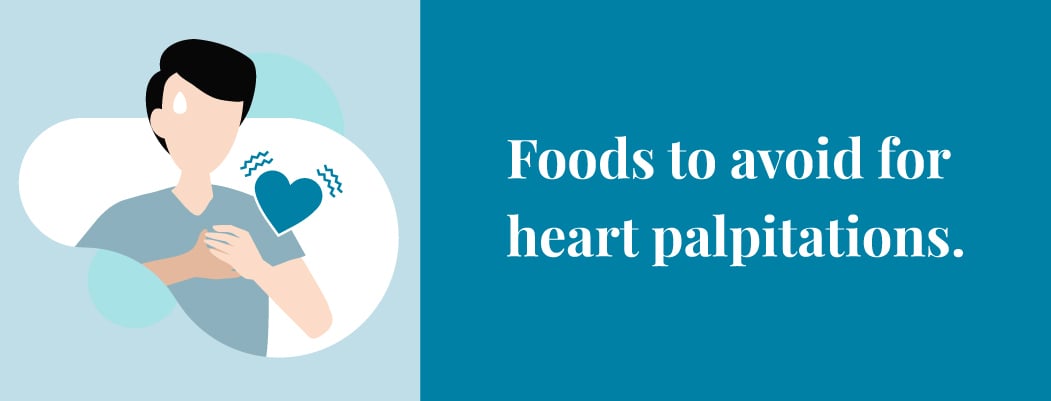Foods to avoid if you have heart palpitations
March 28, 2023

What are Heart palpitations after eating?
Heart palpitations are a sensation of the heart beating faster, pounding, fluttering, or skipping a beat. People experiencing palpitations may notice an increased heart rate or feel their heart beating in their chest, throat, or neck. These palpitations can occur at any time, including after eating. Although they may feel alarming, heart palpitations are typically not a cause for concern.
Heart palpitations can be a scary experience for many people. This condition is characterised by a feeling of fluttering, pounding, or racing in the chest. Although heart palpitations can be caused by a variety of factors, including stress and anxiety, certain foods can also trigger this condition.
Symptoms of heart palpitations after eating
Heart palpitations can occur after eating and can be accompanied by several symptoms, including:
- Fluttering: A sensation of flapping or fluttering in the chest, as if the heart is doing flips.
- Irregular heart rate: The heart may feel like it’s skipping a beat, beating out of rhythm, or fluctuating between speeding up and slowing down. Some people may also experience a brief pause in their heartbeat.
- Pounding: A sensation of the heart beating very hard, which may be accompanied by the sound of the heartbeat in the ears.
It’s important to note that these symptoms are usually harmless. Still, it’s important to seek medical attention if they persist or are accompanied by other symptoms, such as chest pain or difficulty breathing.
Foods to avoid
If you have heart palpitations, it’s important to avoid the following foods to prevent symptoms:
- Caffeine: Caffeine is a stimulant that can cause heart palpitations in some people. This compound is found in coffee, tea, chocolate, energy drinks, and some medications. If you have heart palpitations, limiting your caffeine intake or avoiding it altogether is best.
- Alcohol: Alcohol can cause heart palpitations by increasing heart rate and blood pressure. This compound is also a diuretic, which can cause dehydration and exacerbate heart palpitations. If you have heart palpitations, it’s best to avoid alcohol or limit your intake to one drink per day.
- Processed Foods: Processed foods are often high in sodium, which can cause fluid retention and increase blood pressure, leading to heart palpitations. These foods are also often high in added sugars, which can cause blood sugar spikes and dips, leading to palpitations. Instead of processed foods, choose whole, unprocessed foods like fruits, vegetables, and lean protein.
- Spicy Foods: Spicy foods can cause heart palpitations by increasing heart rate and blood pressure. These foods can also irritate the oesophagus, causing reflux and triggering palpitations. Avoiding spicy foods or limiting your intake is best if you have heart palpitations.It is a common misconception that spicy foods are detrimental to your health. In fact, they can provide benefits such as improved digestion, heart health, reduced inflammation, and increased metabolism. However, consuming spicy food can cause temporary stress on your body when the temperature is sufficiently high. Sweating, excessive thirst, and elevated heart rate are all typical symptoms indicating that you have ingested something particularly spicy and are experiencing irritation in your body. Moreover, some of the sensations you experience as heart palpitations after consuming a spicy meal, may be linked to indigestion or acid reflux.
- Fatty Foods: Fatty foods like fried foods and high-fat meats can increase cholesterol levels, leading to heart disease and palpitations. These foods can also cause acid reflux, which can trigger palpitations. Instead of fatty foods, choose lean protein like chicken, fish, or tofu.
If you experience heart palpitations after eating, modifying your diet could be a viable solution depending on the underlying cause. Here are some dietary changes you can try:
- Incorporating potassium-rich foods like avocados, bananas, spinach, and potatoes into your diet.
- Limiting your alcohol consumption.
- Staying well-hydrated by drinking plenty of fluids.
- Eating regular, balanced meals to avoid drops in blood sugar.
- Monitoring your caffeine intake.
- Reducing the amount of salt and sugar in your diet.
What causes heart palpitations after eating?
There can be several causes of heart palpitations after eating. Some of the common causes include:
- Overeating: When you overeat, your body requires more blood flow to the stomach to aid in digestion. This can cause your heart to beat faster and irregularly.
- Food sensitivities or allergies: Certain foods can trigger heart palpitations in individuals who are sensitive or allergic to them. Common culprits include caffeine, alcohol, chocolate, and spicy foods.
- Low blood sugar: If you have low blood sugar, your body releases hormones like adrenaline, which can cause your heart to race.
- Acid reflux: Acid reflux can cause irritation and inflammation in the oesophagus, which can trigger heart palpitations.
What foods can cause heart palpitations after eating?
Certain foods can trigger heart palpitations in sensitive individuals. These include:
- Caffeine: Caffeine is a stimulant that can cause your heart to race.
- Alcohol: Alcohol can cause heart palpitations, especially if consumed in large amounts.
- Chocolate: Chocolate contains caffeine and theobromine, both of which can cause heart palpitations.
- Spicy foods: Spicy foods can cause heartburn and acid reflux, which can trigger heart palpitations.
- High-fat foods: High-fat foods can take longer to digest, causing your heart to beat faster and irregularly.
Are there other causes of heart palpitations after eating?
Yes, there can be other causes of heart palpitations after eating. These include:
- Anxiety and stress: Anxiety and stress can cause your heart to race and beat irregularly.
- Medications: Certain medications, like asthma inhalers and decongestants, can cause heart palpitations.
- Medical conditions: Medical conditions like hyperthyroidism and arrhythmia can cause heart palpitations after eating.
How do I manage heart palpitations after eating?
To manage heart palpitations after eating, you can try the following:
- Eat smaller, more frequent meals instead of large meals.
- Avoid trigger foods that cause heart palpitations.
- Manage stress and anxiety through meditation, yoga, or other relaxation techniques.
- Stay hydrated by drinking plenty of water.
- Get regular exercise.
- Avoid lying down immediately after eating
When and who should I see about heart palpitations after eating?
You should see your doctor if you experience heart palpitations frequently or if they are accompanied by other symptoms like chest pain, shortness of breath, or dizziness. Your primary care physician or a cardiologist can help diagnose the cause of your heart palpitations and recommend treatment options.
People also ask
What foods reduce heart palpitations?
- Some foods that may help reduce heart palpitations include:
- Magnesium-rich foods such as spinach, almonds, avocado, and dark chocolate
- Potassium-rich foods such as bananas, sweet potatoes, and tomatoes
- Omega-3 fatty acid-rich foods such as fatty fish, chia seeds, and walnuts
- Complex carbohydrate-rich foods such as brown rice and quinoa
- Foods with B vitamins such as whole grains, beans, and leafy greens
What stops heart palpitations fast?
- Some techniques that may help stop heart palpitations quickly include:
- Vagal maneuvers such as holding your breath or bearing down as if having a bowel movement
- Coughing forcefully
- Applying a cold compress to your face
- Drinking ice water
- Splashing cold water on your face
- Gently massaging the carotid artery in your neck
However, if you experience frequent or severe heart palpitations, it is important to see a doctor for proper evaluation and treatment.
Are bananas good for heart palpitations?
Bananas are a good source of potassium, which is an essential mineral that plays a role in regulating heart function. Potassium deficiency can lead to heart palpitations, so consuming potassium-rich foods like bananas may help prevent or reduce heart palpitations.
Which fruit is best for heart palpitation?
There is no one specific fruit that is best for heart palpitations. However, fruits that are rich in potassium and magnesium, such as bananas, avocados, and oranges, may help regulate heart function and reduce the occurrence of heart palpitations.








